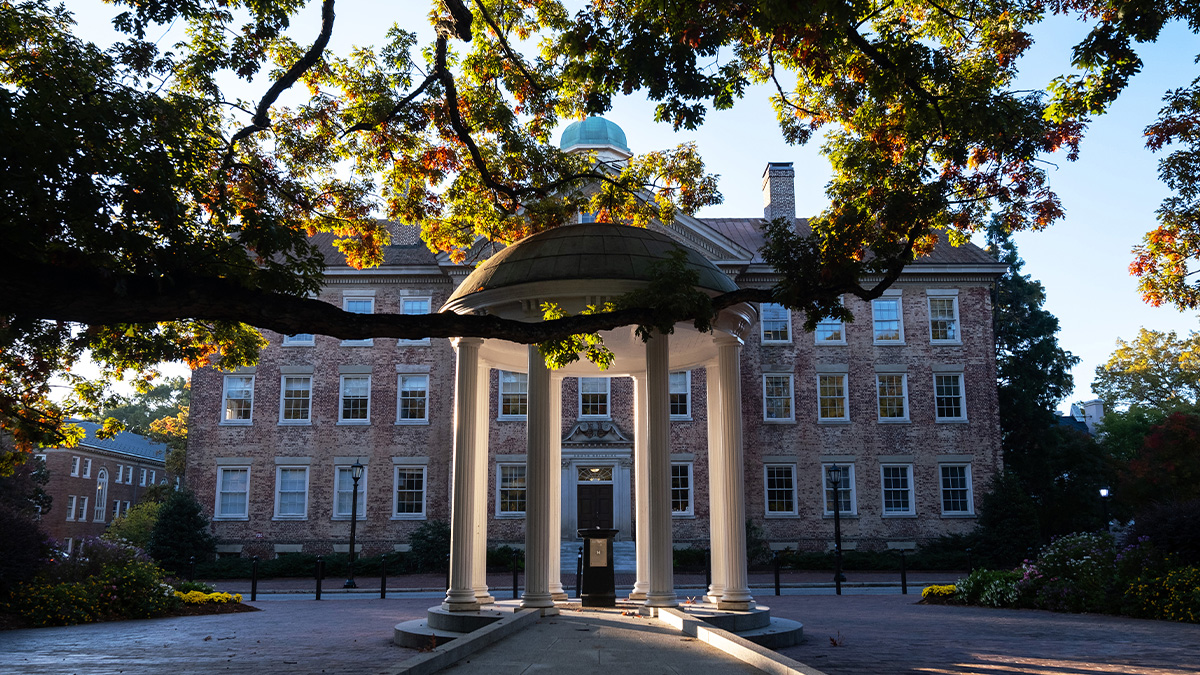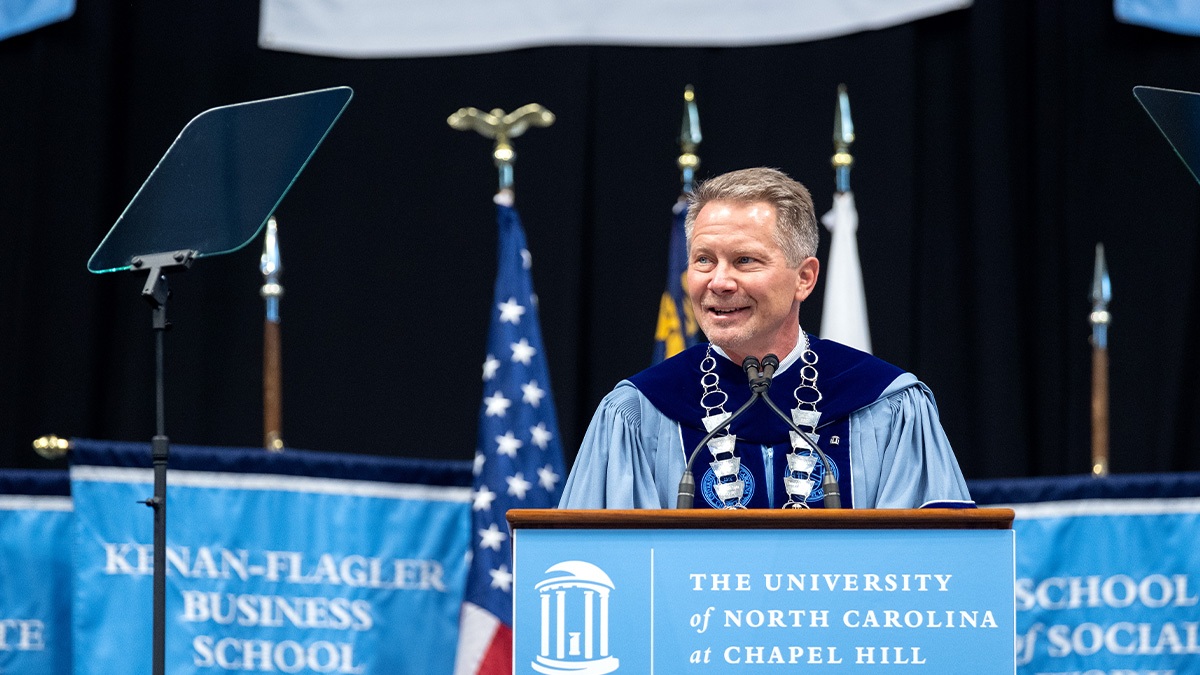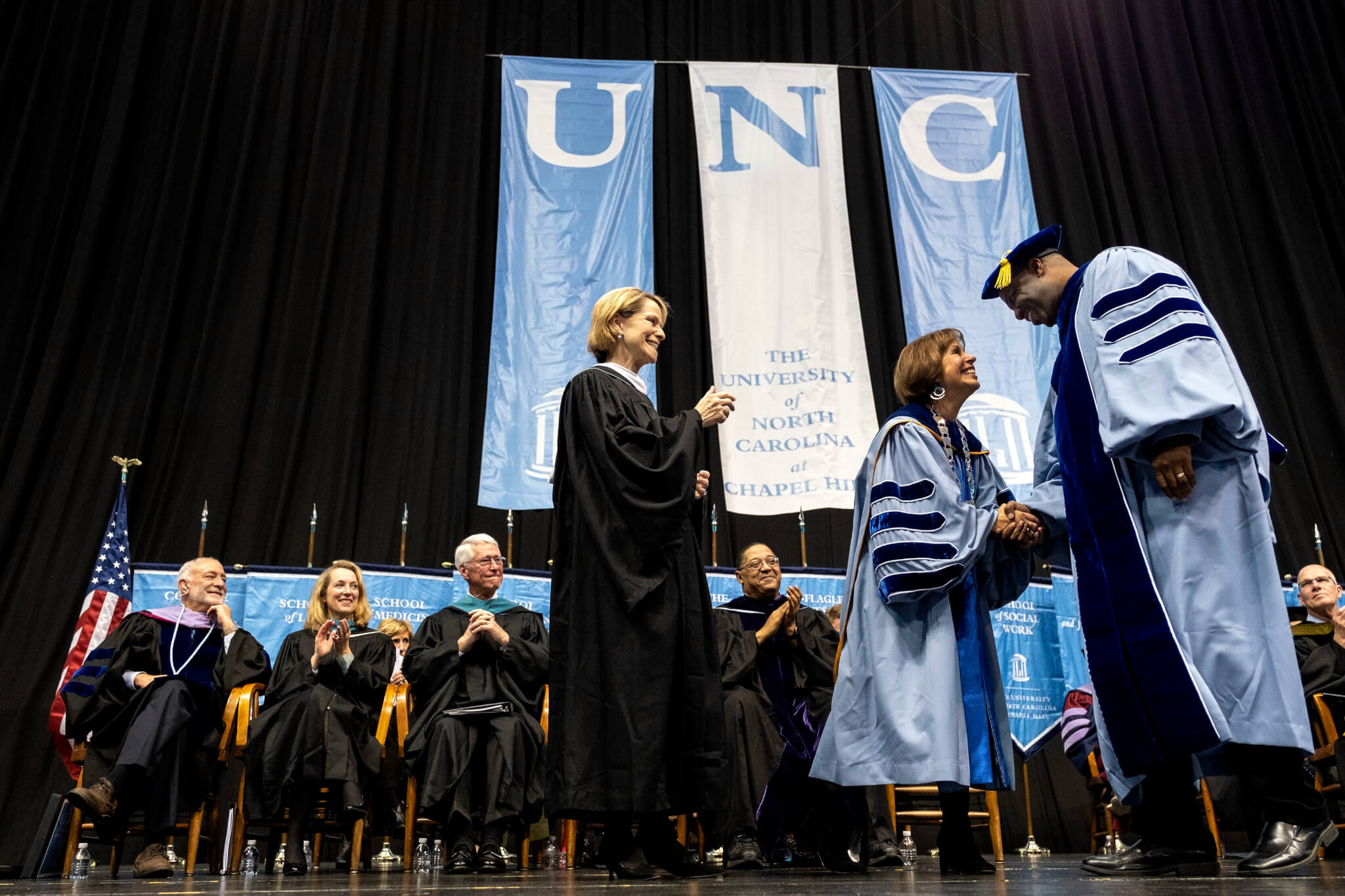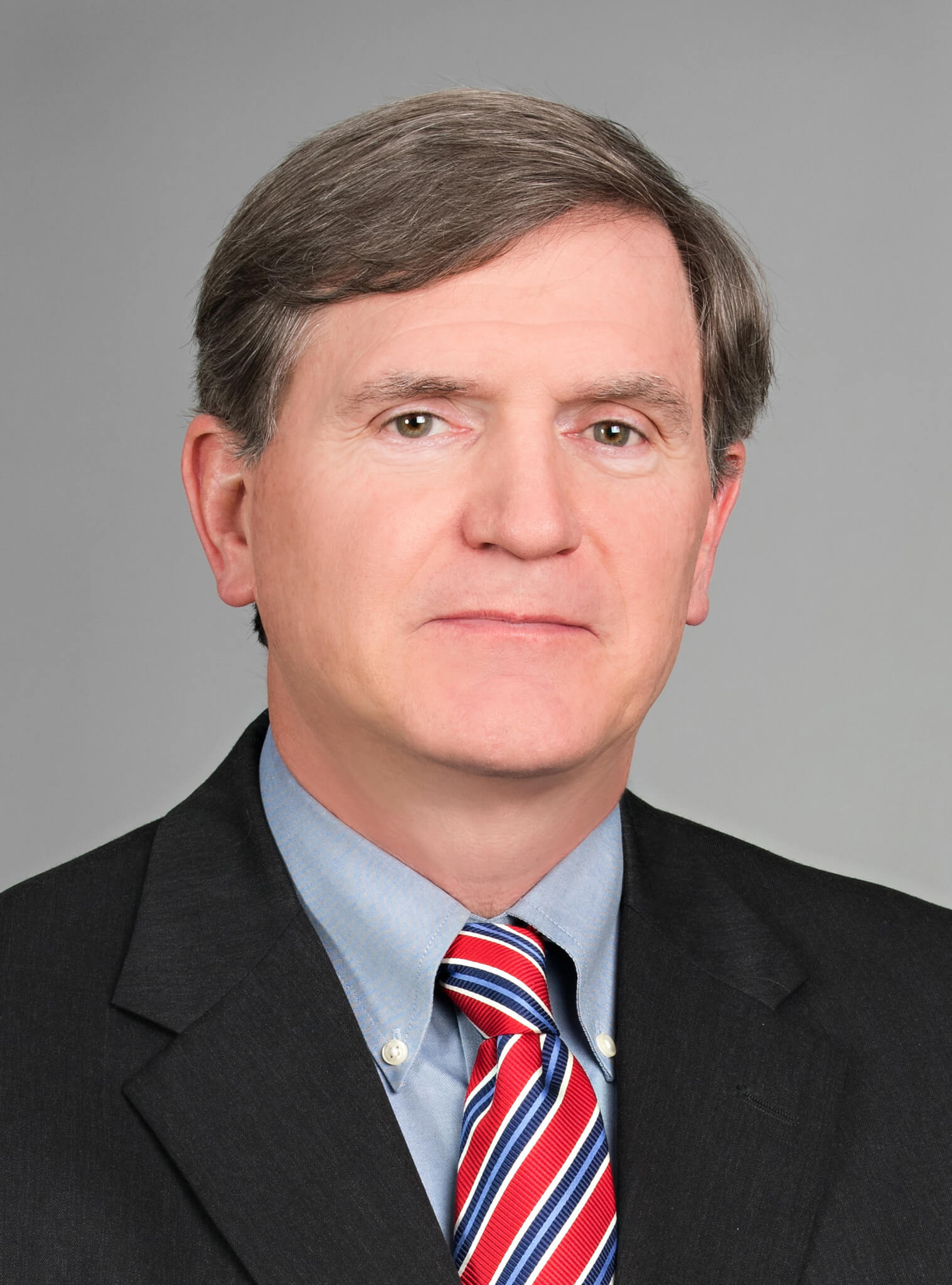Listening — and learning
Over the course of two jam-packed days, UNC System President Margaret Spellings got a chance to spend time with her neighbor up the hill.
And the neighbor got a chance to meet her – and show off a little bit.
“I’m here to visit and learn about the amazing things that are happening here — with scholarships, innovation, student learning, partnerships with the military, with the arts community, with the scientific community and on and on,” Spellings said while spending March 22 and 23 at the University of North Carolina at Chapel Hill, her latest stop on a state-wide listening tour during which she plans to see all 17 campuses within her first hundred days on the job. Spellings took office March 1. “It’s just a tremendous example of the mighty engine that the University of North Carolina system is.”
Wednesday’s stops spotlighted some of Carolina’s best-known research: the Biomedical Research Imaging Center, the Marsico Lung Institute, the Matthew Gfeller Sport-Related Brain Injury Research Center and the Joint Applied Math and Marine Sciences Fluids Lab at Chapman Hall. Spellings gamely peeked into microscopes, operated manipulator arms used to work with radioactive research materials and slapped at a bouncing blue dot on a screen to test her hand-eye coordination.
After all that, she got the chance to chat with Carolina’s two Nobel Prize-winning scientists: Oliver Smithies, who won in 2007, and Aziz Sancar, who won last year. At a brief meet-and-greet in the Carolina Inn, Spellings recognized them at once.
“I saw your giant picture somewhere,” Spellings said, referring to the sign congratulating the Nobel winners that spans the dentistry bridge.
She discovered that each man came to Carolina as half of an academic power couple. Smithies is married to Nobuyo Maeda of the Department of Pathology and Laboratory Medicine, and Sancar’s wife, Gwen Sancar, is in the Department of Biochemistry and Biophysics.
“I came on my wife’s coattails. She got an offer, so I asked if anybody was interested in me coming to Chapel Hill,” Smithies told Spellings.
Then Sancar added a dramatic twist. “Dr. Smithies, you may not know it, but I was on the search committee that recruited her.” He smiled broadly and held up two fingers. “So I’m responsible for two Nobel Prizes.”
‘Opportunity’
Spellings’ tour began shortly after 11 a.m. Tuesday at the iconic heart of campus: the Old Well on McCorkle Place.
To her delight, she found the well already occupied by another group of invited guests – middle school students from a charter school in Gaston County on a Visitors’ Center tour of campus.
At Graham Memorial, she listened to first-generation students from Pembroke, Pittsboro and Puerto Rico share their stories about the unique paths they followed to Chapel Hill and Carolina’s commitment to make college accessible and affordable to all.
At the 1789 Venture Lab on Franklin Street, she heard student entrepreneurs explain ideas that ranged from The Helping Hand Project (that uses 3-D printing to produce prosthetic hands at a cost of $30) to Cool Soles, a heat-resistant shoe insert that can protect an athlete’s foot from the surface heat of synthetic turf.
Spellings also got the chance to “scratch” her first record at the lab, thanks to Mark Katz, director for the Institute for the Arts and Humanities, and musician and educator André Barden, also known as the DJ A-Minor. Katz and Barden had partnered in a hip-hop diplomacy program called the Next Level.
Katz handed Spellings the microphone, with the instruction to speak a word or phrase that she could “scratch” into music.
Spellings paused and said: “Opportunity.”
Before long, the room filled with a throbbing hip-hop beat swirling around a word that captured, perhaps better than any other, exactly what Spellings said she wants for every student who comes to any and all of the 17 campuses within the UNC system.
And it is also what she hopes students, faculty and staff will be willing to give her.
Asked what she would like to say to student protesters who yelled chants against her during her visit, Spellings said, “The first thing I would say to them is give me a chance,” Spellings said. “This is the start of my fourth week on the job and I’m getting about the state, looking at every campus and hearing what people are proud of and what they think our challenges are.
“I’m all ears. I want to hear obviously from everyone with a different point of view. We’ll attend to their concerns and issues the best we can.”
At a table that stretched the length of Gerrard Hall, Spellings spent more than an hour Tuesday listening to students and responding to their questions, followed by another hour-long session with faculty and staff.
Student Body President Houston Summers and other students asked Spellings about her commitment to protect and promote diversity at Carolina in order to “keep this place a truly public university.”
The pursuit of that ideal of inclusiveness has been started, student Jaelyn Coates added, but the work is not complete. Coates, an African American student majoring in political science and African, African American and Diaspora Studies, is the chair of the Carolina Union Board of Directors.
“This country was not created for people of color,” Coates said, “and this school wasn’t created for people of color. How do we address that honestly?”
By not being afraid to talk about it honestly, Spellings answered, and to work toward creating a campus culture that is warm, welcoming and accommodating to all.
The UNC system does a good job of educating elites, she added, but it needs to do a better job of educating students of color and students who are the first in their family to attend college.
Speaking for the faculty, Faculty Chair Bruce Cairns told Spellings, “We like to see ourselves as elite, but not elitist.”
What makes the University truly great, Employee Forum Chair Charles Streeter told Spellings, are the people who come to work here every day and pour their hearts into fulfilling its deeply rooted mission of teaching, research and public service.
The takeaway from such comments, Spellings said, is that faculty and staff “think they are stewards of something that will have implications far into the future.”
“There is a real sense of purpose about being part of an institution that has been so mighty and so long-lasting,” she said.
A work in progress
Chancellor Carol L. Folt, who accompanied Spellings on every stop of the two-day tour, told reporters that Spellings embraced the idea that Carolina will always be a work in progress, continually striving to do more and figuring out how to do what it already does better.
That idea of strength and endurance – and the unending need for rebirth and renewal – was captured by University Forest Manager Tom Bythell, who knows more about the campus’s 11,000-plus trees than many people know about members of their own family.
Bythell escorted Spellings and Folt across McCorkle Place and led them, inevitably, to the historic Davie Poplar, where Carolina’s founders stopped more than 200 years ago to tie their horses – and plant the seeds for the country’s first public university campus.
He told the story of Davie Junior, a graft from the Davie Poplar that the Class of 1918 had planted on March 16, 1918, and the story of Davie Poplar III, grown from the eldest tree’s seed.
Bythell told the story of how groundskeeper Bus Hubbard, who had climbed the University’s trees for 60 years before he retired, had scaled Davie Junior several years before the 1993 Bicentennial Observance to gather the seeds that produced the 100 saplings that would later be planted in a schoolyard in every county in North Carolina.
At the end of the tour, Bythell and Spellings stood before a small dogwood tree, one of the trees Spellings is giving to each campus as she visits them.
It was small and fragile, with roots yet to be planted, but its tender branches were aglow with blossoms and the promise of spring.
“I couldn’t be prouder of UNC-Chapel Hill than I am today, having been through this amazing event,” Folt said. “Seeing through the people who work here and learn here, their belief in the the future, made me feel that I am so lucky to be a part of this amazing institution.”



